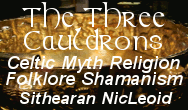Pagan Paths
You've heard of Pagans who are naturalists, humanists, atheists, agnostics, or the like, but what's it all about? Discover the wonder of a naturalistic path rooted in science and myth.
"Pagan" is a constellation, not a star
A constellation is not an object, it's a pattern of objects visible from a certain perspective. Look from a different perspective, and the pattern disappears.
That's what's going on right now with the raging controversies over the meaning of the word "Pagan." From some perspectives it makes sense, from others it does not. And since no single perspective has authority, neither does any single definition.
The constellation dilemma
Here's a small sampling of the questions skewed by the constellation dilemma:
- Is Paganism any non-Abrahamic religion, or does it have more specific characteristics?
- Can atheists be Pagans or not?
- Can Christians be Pagans or not?
- Is Paganism a nature religion or not?
To be fair, many of the authors linked to above give fair and sensitive treatments of the subject. But that doesn't change a single glaring fact:
Not one of these is an answerable question.
The reason is simple: from different perspectives, the pattern under debate looks different and yields divergent answers. Talking about these questions can help us understand our differences - which is good - but it would be foolish to get frustrated when we inevitably find no final answer forthcoming.
Forget the constellation
We keep treating "Pagan" like it's a star, an object that ought to look the same from any perspective. And we throw our hands up in frustration when other people just can't see what we see.
Instead of continuing to beat each other over the head with the constellations we see or don't see, we should start talking about what's really there: stars.
Look to the stars
If "Pagan" is a constellation, then what are its stars? The stars would be the concrete phenomena going on within Paganism: ritual acts, magical intentions, divine invocations, cultural traditions, natural cycles, community celebrations, and so on.
If we concentrate on the stars, we'll likely find that the exact same stars may not be included by everyone in their personal constellation. Polytheism may be in yours, but naturalism is in mine. Christian elements may be in someone else's. Nevertheless, I think we'll find that many stars are still shared in common.
Precisely which stars are shared may differ as well, but overall I suspect we'll find we're all looking at roughly the same region of sky. Even if we don't, though, we'll still be far more enriched by studying stars than debating constellations.
Our future in the stars
With the amount of energy we've been putting into arguing the meaning of "Pagan", we could have landed one of us on the moon by now. How much better would it be if we stopped asking unanswerable questions, and got down to the nitty-gritty?
I don't mean to put a moratorium on all debate over the word. As mentioned above, such dialogue can help us understand each other and our differences. I do mean to shift attention to what we can really talk about: the concrete things we "Pagans" do.
What if we devoted our energy to questions like:
- Do magical effects really work, and how do we know?
- Which magical effects work, and which don't? Why?
- If deities are a part of nature, as some of us say, what does that mean exactly?
- If deities are real, then can we measure their effects on the world, and how should we infer from effect to cause?
- If deities are symbolic, how does the mind interpret such symbolism?
- Whichever view we take (real or symbolic), do our interactions with deities actually reflect that view, or do they presume something else?
- Which ritual techniques work for a given purpose, and why do they work (e.g. how do they exploit capacities of the brain and body)?
- Which activities actually knit us into a community, rather than divide us?
These sorts of questions are answerable, and would get us much farther than ceaselessly frustrating ourselves over the meaning of "Pagan."
Image credit: Vulpecula constellation by Reitzg
Comments
-
Please login first in order for you to submit comments




















